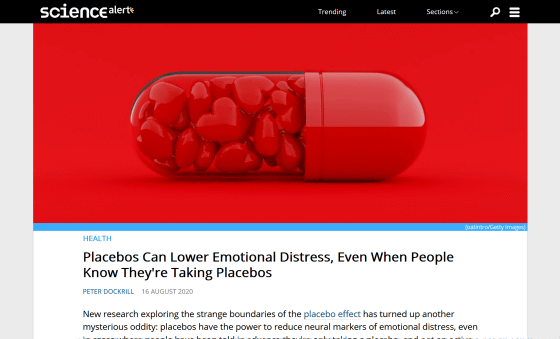Even if you know that you are taking a placebo, the placebo effect may be exerted.

The phenomenon in which some effect appears on the patient or subject even when taking a 'placebo' that looks real but has no
Placebos without deception reduce self-report and neural measures of emotional distress | Nature Communications
https://www.nature.com/articles/s41467-020-17654-y
Placebos prove powerful… even when people know they're taking one | MSUToday | Michigan State University
https://msutoday.msu.edu/news/2020/placebos-prove-powerfuleven-when-people-know-theyre-taking-one
Placebos Can Lower Emotional Distress, Even When People Know They're Taking Placebos
https://www.sciencealert.com/placebos-can-lower-emotional-distress-even-when-people-know-they-re-taking-placebos

In clinical trials to determine the effect of a drug, some subjects may be given a placebo in a
The placebo effect is a phenomenon in which believing that you are 'taking the real drug' brings some improvement, even though you are actually taking a placebo that should not be effective. Even in places other than clinical trials, there are cases where doctors pretend to be drugs and give vitamins to patients in anticipation of a placebo effect.
However, it has been pointed out that there are ethical issues regarding the false administration of placebo as a genuine drug. Therefore, the research team revealed to the subjects that 'this is a fake drug and does not contain any scientific ingredients that are actually useful', and then what kind of effect will appear if the fake drug is administered. I decided to confirm by experiment.

A research team led by Darwin Guevarra, a psychologist at Michigan State University, found 40 images designed to give viewers negative emotions after giving subjects a 'saline spray.' We conducted an experiment to show the subject.
In this experiment, half of the subjects were told that 'spray is a placebo' and that the placebo effect was explained. The subjects were also told that 'if you believe that a placebo effect will occur, a saline spray may help alleviate negative emotions.' On the other hand, the subjects in the control group were only told that the saline spray was 'necessary to obtain physiological data' and did not explain the placebo or placebo effect.
Two types of experiments were conducted. In the first experiment, the subjects reported 'how much they felt mental distress' after the experiment, and in the second experiment, the brain waves of the subjects viewing the image were examined and how much. It was measured whether he remembered his mental distress.
In the first experiment, which involved 62 people, subjects who were briefed on the placebo and placebo effects reported lower levels of psychological distress than those in the control group. Also, in the second experiment in which 198 people participated, it was found that the biomarkers showing mental distress were significantly reduced in the brains of the subjects who were explained about the placebo effect and the placebo effect. ..

The researchers argue that the findings show psychophysiological effects, at least in the area of relieving mental distress, even when they are told they are placebos. By further research, he states that in the future, administering a placebo without pretending to be a real drug may be used as a safe and practical treatment.
Related Posts:
in Science, Posted by log1h_ik







